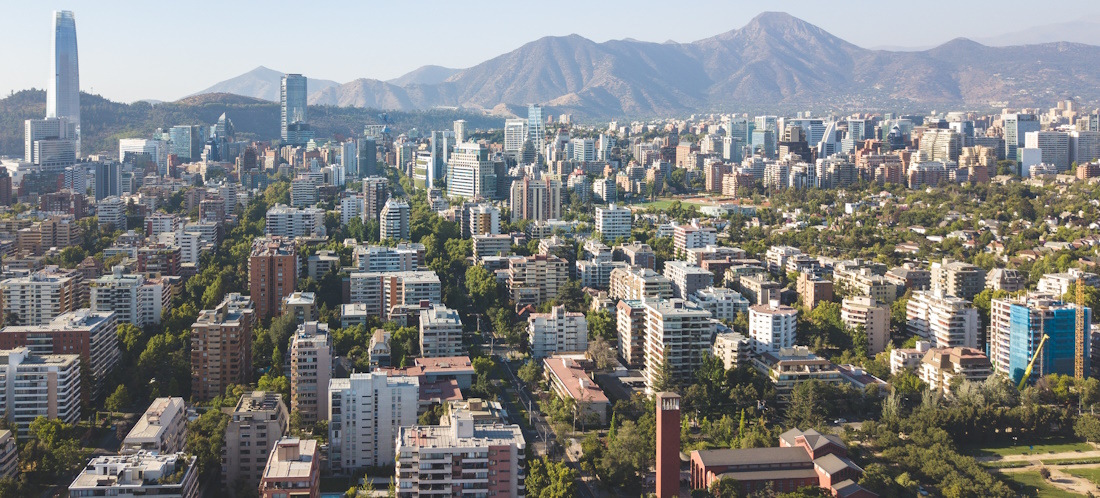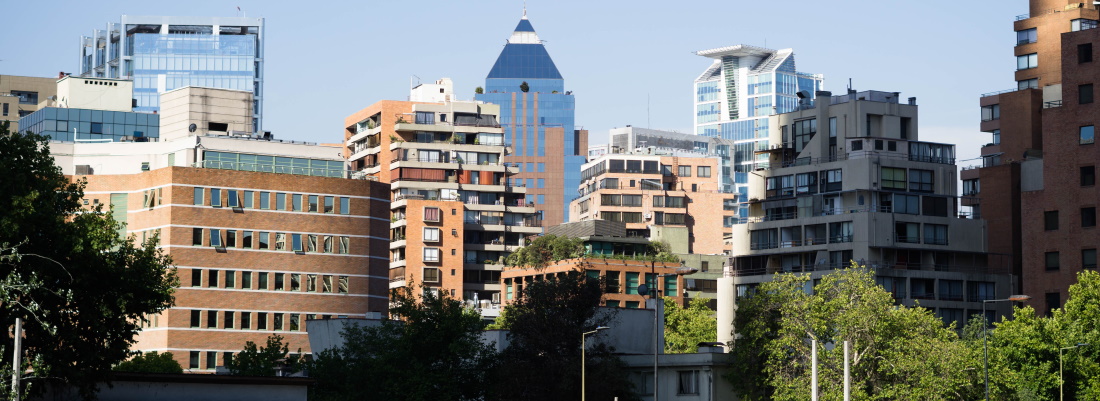Finding a property to rent in Santiago may be the biggest hurdle in the whole renting process due to high demand. More and more people are moving to Santiago, and the housing stock must meet this need. Luckily, the dollar holds formidable acquisition power in the city, so earning it makes finding a suitable place to rent considerably easier. Read on to find out more about accommodation in Santiago.
Areas and suburbs in Santiago
 Popular areas in Santiago include Ñuñoa, known for its tranquil atmosphere and green spaces; Providencia, characterised by its tree-lined streets and vibrant city life; and Las Condes, a relatively affluent area with a significant expat population. For those seeking more budget-friendly options without compromising on quality, La Reina offers a balanced mix of residential comfort and access to amenities.
Popular areas in Santiago include Ñuñoa, known for its tranquil atmosphere and green spaces; Providencia, characterised by its tree-lined streets and vibrant city life; and Las Condes, a relatively affluent area with a significant expat population. For those seeking more budget-friendly options without compromising on quality, La Reina offers a balanced mix of residential comfort and access to amenities.
Another notable area is Santiago Centro, the heart of the city, which offers a rich historical and cultural experience. While it’s bustling and lively, it’s essential for newcomers to be aware of the varying safety levels in different parts of this district.
For those who prefer a more artistic and bohemian lifestyle, the Barrio Bellavista presents an eclectic mix of cultural experiences, from vibrant nightlife to art galleries and theatres. This area especially appeals to younger expats and those who enjoy a lively social scene.
Find out more in our comprehensive guide to the Best (and Worst) Areas and Suburbs in Santiago.
Types of accommodation in Santiago
 Most of the accommodation in Santiago comes in the form of ‘piezas’ or apartments. It’s also possible to find houses for rent, and some expats prefer those in gated complexes, especially in the more expensive areas of the city.
Most of the accommodation in Santiago comes in the form of ‘piezas’ or apartments. It’s also possible to find houses for rent, and some expats prefer those in gated complexes, especially in the more expensive areas of the city.
When considering the location of accommodation, expats should think about proximity to schools as well as work and other amenities.
Both furnished and unfurnished accommodation are available, although fully stocked apartments cost more. Unfurnished apartments will generally come with no furniture or appliances, so expats should try to negotiate to include major appliances such as refrigerators and ovens.
Finding accommodation in Santiago
 Using personal connections is the most popular way to find accommodation in Santiago. One of the best ways for expats to find suitable accommodation quickly is to talk to fellow expats or locals – anyone from a colleague to a friendly shopkeeper in the desired neighbourhood might be able to lend a hand.
Using personal connections is the most popular way to find accommodation in Santiago. One of the best ways for expats to find suitable accommodation quickly is to talk to fellow expats or locals – anyone from a colleague to a friendly shopkeeper in the desired neighbourhood might be able to lend a hand.
If this doesn’t pan out, there are also a number of rental agencies and relocation companies that specifically cater to the expat community. These service providers make finding accommodation much more straightforward but far more costly. The good news is that the final fee for the agent will typically be split between the tenant and landlord.
It’s important to note that fluency in, or at least a basic command of, Chilean Spanish will significantly help during the initial property search and negotiations. It might be helpful to bring along a local friend – this way, expats are far likelier to get a better deal.
Expats can find accommodation in newspaper property listing sections, online portals such as CompartoDepto, Vivastreet and ACOP and on Facebook groups.
Useful links
- Explore a wide range of properties on Portal Inmobiliario, offering comprehensive listings and options.
- Discover unique rental opportunities with Goplaceit, known for its user-friendly interface and extensive database.
- For a diverse array of property listings, check out Yapo.cl, a popular choice among locals and expats alike.
- Visit FazWaz.cl for a modern approach to finding your next home with advanced search tools.
Renting accommodation in Santiago
 Making an application
Making an application
Applying for rental accommodation in Santiago begins with a thorough search, either online or through local contacts and agencies. Expats should be prepared to provide various documents during the application process, including identification, proof of income or employment, and sometimes references from previous landlords.
It’s also common practice for landlords to request a credit check to ensure the reliability of potential tenants. This might pose a challenge for expats who are new to the country and lack a local financial history. Additional documentation, such as bank statements or an employment contract, may be required to demonstrate financial stability.
Once a suitable property is found, expats must express their interest formally by completing an application form provided by the landlord or rental agency. This is an important step as it initiates the rental agreement process and is typically followed by negotiations on the terms and conditions of the lease.
Leases, costs and fees
Rental agreements in Santiago are generally for a 12-month period, but shorter terms can be negotiated, though usually at a higher price.
Depending on the landlord, expats may be required to have a Chilean guarantor to secure a rental contract. In most cases, an expat’s employer will act as a guarantor, but this is not always possible. In instances where a guarantor is required, but expats are unable to find one, they can negotiate to pay a larger security deposit.
Expats should be sure to get a full and detailed inventory of the apartment and its contents, as they will be liable for any damage beyond normal wear and tear.
Landlords generally require a deposit amount of at least one month’s rent. Additionally, expats should be aware that some landlords might charge a ‘move-in’ fee, which covers administrative costs such as drafting the lease agreement and property maintenance checks before occupancy.
Utilities in Santiago
 When it comes to utility costs, these are usually not included in the rent. Tenants are typically responsible for paying their own utilities, which include water, electricity, gas and sometimes community charges if living in a building with shared facilities like a pool or gym. It’s crucial for expats to clarify what is included in the rent and what isn’t before signing the lease to avoid unexpected expenses.
When it comes to utility costs, these are usually not included in the rent. Tenants are typically responsible for paying their own utilities, which include water, electricity, gas and sometimes community charges if living in a building with shared facilities like a pool or gym. It’s crucial for expats to clarify what is included in the rent and what isn’t before signing the lease to avoid unexpected expenses.
Electricity
In Santiago, the electricity sector is served by several key providers, including Enel Chile, the largest electricity holding company in the region. Other notable providers in the city are Schneider Electric, ENGIE, Wood, Fluor and Shell, all contributing to a diverse energy market.
Bills are typically issued monthly and can be paid through various convenient methods, including online banking, automatic bank transfers or in person at the provider’s office or authorised payment locations.
The Chilean government actively works to make electricity affordable, particularly for low-income households. The implementation of subsidies, activated when there’s a significant increase in electricity tariffs, is a testament to this commitment.
For more information on electricity providers and subsidies in Santiago, visit the official websites of Enel Chile and the Chilean Ministry of Energy.
Gas
In Santiago, the provision of gas is primarily through a piped network rather than bottled gas, ensuring a steady and reliable supply to residents and businesses. Metrogas, Chile’s leading natural gas distribution company, plays a pivotal role in this network. They are renowned for their innovative practices, particularly at the La Farfana Wastewater Treatment Plant, where they convert digester gas into renewable natural gas.
Alongside Metrogas, Electrogas is another significant provider in the region. They operate a crucial natural gas transmission system that connects the Quintero LNG Terminal to the Santiago metropolitan area, enhancing the city’s access to natural gas. This network is vital for residential and commercial users, ensuring a consistent energy supply throughout the area.
The country’s reliance on LNG imports, primarily from Argentina, has facilitated the development of a robust gas infrastructure. This expansion is not just limited to industrial users; there is an ongoing initiative to connect more residential users in larger cities to the natural gas transmission system, reflecting the growing importance of natural gas as a primary energy source in the region.
For more details on gas providers and the natural gas distribution system in Santiago, visit the official websites of Metrogas and Electrogas.
Water
Aguas Andinas, the region's main water provider, primarily manages Santiago’s water supply. This company is crucial in ensuring the delivery of drinking water across Santiago, contributing significantly to the city’s high levels of coverage and water quality. Other providers like Essal and Essbio also play a role in the city’s water supply network, enhancing the reliability and reach of water services.
Santiago’s water supply and sanitation sector has significantly transformed since the late 20th century, resulting in Santiago being recognised for its superior water coverage and quality levels compared to other Latin American cities.
For more information on water providers and the water supply system in Santiago, visit the official websites of Aguas Andinas, Essal and Essbio.
Bins and recycling
In Santiago, the approach to waste management and recycling is becoming increasingly structured and eco-conscious. Most residential and commercial buildings have designated bins for general waste and recycling, reflecting a growing emphasis on environmental responsibility. The general waste is collected weekly, while recycling pick-ups usually occur fortnightly.
Recycling facilities in Santiago accept various materials. The most commonly recycled items include cardboard, newspapers, glass and plastic water bottles. Residents are encouraged to separate these recyclables from their general waste to facilitate efficient recycling.
However, it’s important to note that not all recycling points in Santiago accept every type of material. Residents should consult local recycling maps to locate the nearest recycling point that accepts the specific materials they wish to recycle.
To learn more about recycling facilities and waste management in Santiago, visit the official website of the Ministry of the Environment of Chile.
Internet
Santiago’s digital landscape is serviced by several top-tier internet service providers (ISPs), including well-known names like Claro, VTR and Movistar.
One of the key offerings in the Chilean internet market is the availability of prepaid internet services. This option is particularly advantageous for expats who may not be ready to commit to a long-term contract. These services are accessible via dongles, which can be purchased and recharged at any ISP counter or store, offering a flexible and user-friendly way to access the internet.
The competitive nature of Chile’s telecommunications industry means that expats can expect fast and reliable internet services, a factor that has contributed to the country having the highest computer and internet penetration in Latin America.
For more information on internet services in Santiago and to compare different ISPs and their plans, visit the official websites of Claro, VTR and Movistar.
What do expats say about accommodation options in Santiago?
"New apartment buildings tend to have a lot more amenities than older buildings but the rooms are smaller. Amenities you typically see are rooms you can rent for parties, pools and gyms. New apartments also are more likely to have central heating." Read Noëlle's interview for more on housing in the capital city.
"For security reasons, most expats prefer to live in apartments with a shared communal garden or houses in gated condominiums. Some like to live in larger detached homes." Read more about types of housing in Nina's interview.
Further reading
►See Areas and Suburbs in Santiago to find out the best areas for expats to live in the city
►Read more about Accommodation in Chile
Image credits: Meeting the Rental Agent by Ivan Samkov on Pexels. Santiago Landscape by Francisco Kemeny, Medium- and High-rise Buildings by Caroline Pasarin, both on Unsplash.
Are you an expat living in Santiago?
Expat Arrivals is looking for locals to contribute to this guide, and answer forum questions from others planning their move to Santiago. Please contact us if you'd like to contribute.
Expat Health Insurance
Cigna Global Health Insurance.
Medical insurance specifically designed for expats. With Cigna, you won't have to rely on foreign public health care systems, which may not meet your needs. Cigna allows you to speak to a doctor on demand, for consultations or instant advice, wherever you are in the world. They also offer full cancer care across all levels of cover, and settle the cost of treatments directly with the provider.
Moving Internationally?
International Movers. Get Quotes. Compare Prices.
Sirelo has a network of more than 500 international removal companies that can move your furniture and possessions to your new home. By filling in a form, you’ll get up to 5 quotes from recommended movers. This service is free of charge and will help you select an international moving company that suits your needs and budget.
Get your free no-obligation quotes from select removal companies now!


